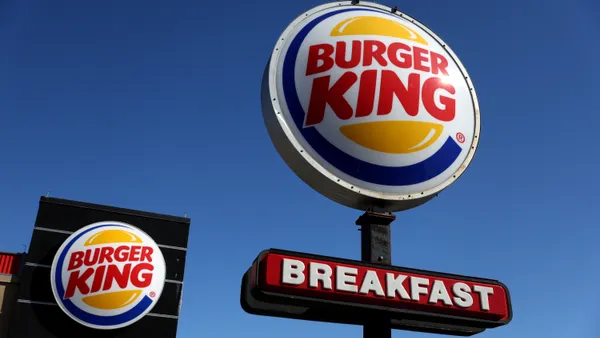Dive Brief:
- McDonald's is suing former company CEO Steve Easterbook in Delaware state court to take back his compensation and 26 weeks of severance benefits, claiming that the ousted executive lied during the restaurant's internal probe into his consensual relationship with an employee, according to a Securities and Exchange Commission filing Monday. The QSR claims that an anonymous tip it received in July, which claimed that Easterbrook had a physical relationship with an employee despite his denial, prompted further investigation.
- A probe found that Easterbrook allegedly had three additional sexual relationships with employees before his termination, and tried to destroy records of this. The probe also found dozens of nude or sexually explicit photos and video footage of female employees that were taken in 2018 and 2019 and sent from his McDonald's email account to his personal email, the lawsuit alleges. Easterbrook also "approved an extraordinary stock grant, worth hundreds of thousands of dollars, for one of those employees in the midst of their sexual relationship," according to the lawsuit.
- McDonald's will also bar Easterbrook from taking stock options or selling any stock from outstanding equity rewards.
Dive Insight:
According to the filing, when allegations arose that Easterbook was engaging in an inappropriate personal relationship with an employee in October of 2019, Easterbrook told McDonald's that the relationship was never physical, that it was the only relationship he had ever had with an employee and that he had never engaged in a sexual relationship with any of his subordinates. The complaint McDonald's filed today reveals how much Easterbrook may have allegedly covered up to claim his firing was "without cause" and secure his $42 million exit package.
Easterbrook's post-firing compensation has been under scrutiny since he was terminated in November of last year. Last fall, a group of investors and New York City's comptroller urged McDonald's to enforce a more robust "clawback" policy and said they were "distressed" by the decision to give him with "substantial severance pay and enable him to retain grants."
Critics scrutinized both the size of the severance package and the fact that it was granted despite the fact Easterbrook was in direct violation of company policy. The decision was also made against the backdrop of McDonald's employees fighting for higher wages, orders that McDonald's pay $26 million to resolve issues of wage theft and allegations that sexual harassment continues to run rampant across the chain.
"We now know that his conduct deviated from our values in different and far more extensive ways than we were aware when he left the company last year," current CEO Chris Kempczinski wrote to employees in a letter, according to CNN. "McDonald's does not tolerate behavior from any employee that does not reflect our values."
But the company's legal action against Easterbrook may not be enough to convince critics and employees that it takes those values seriously. Just last month, a McDonald's franchisee agreed to pay $12,500 to settle a U.S. Equal Employment Opportunity Commission lawsuit claiming that a teenage employee was subjected to a sexually hostile work environment. In April, a $500 million class-action sexual harassment lawsuit claimed female employees faced "severe or pervasive sexual harassment" at around 100 corporate-owned McDonald's restaurants in Florida.
The frequency of sexual harassment complaints lobbed at both corporate-owned and franchised McDonald's restaurants paints a picture of institutionalized sexual misconduct at the chain, and Easterbrook's alleged hidden behavior compounds this reputation. Even though McDonald's has acknowledged its issues in the past and pledged to improve, launching an anonymous sexual harassment hotline, the chain's ever-growing count of sexual harassment infractions looms larger than any of its attempts to get back on track.














